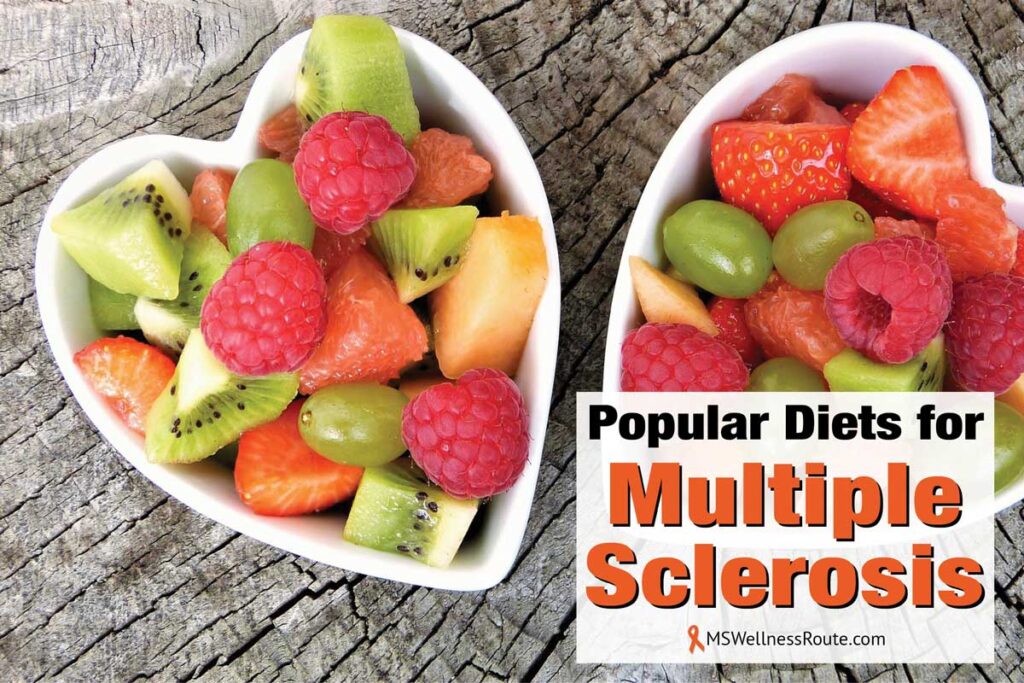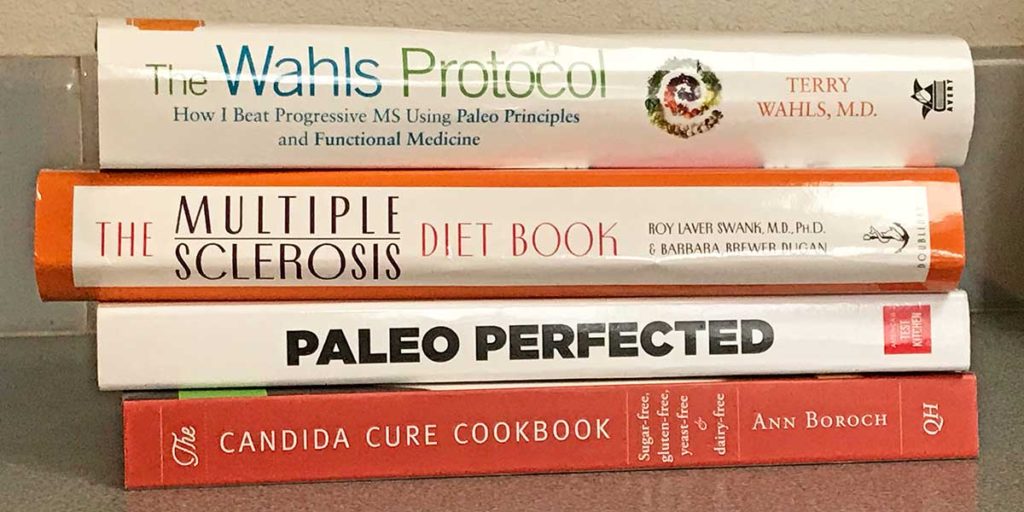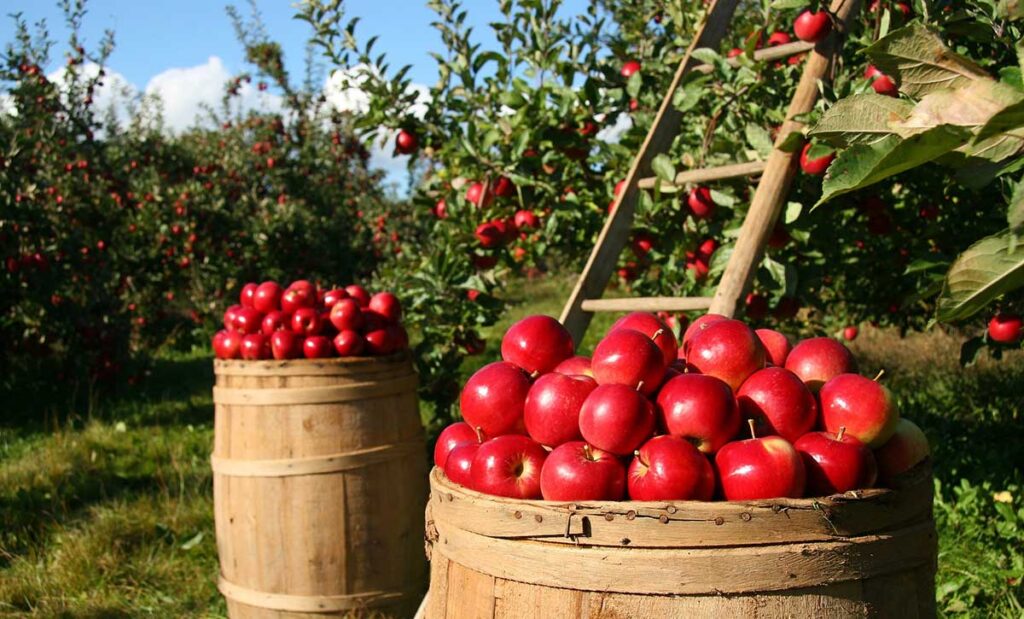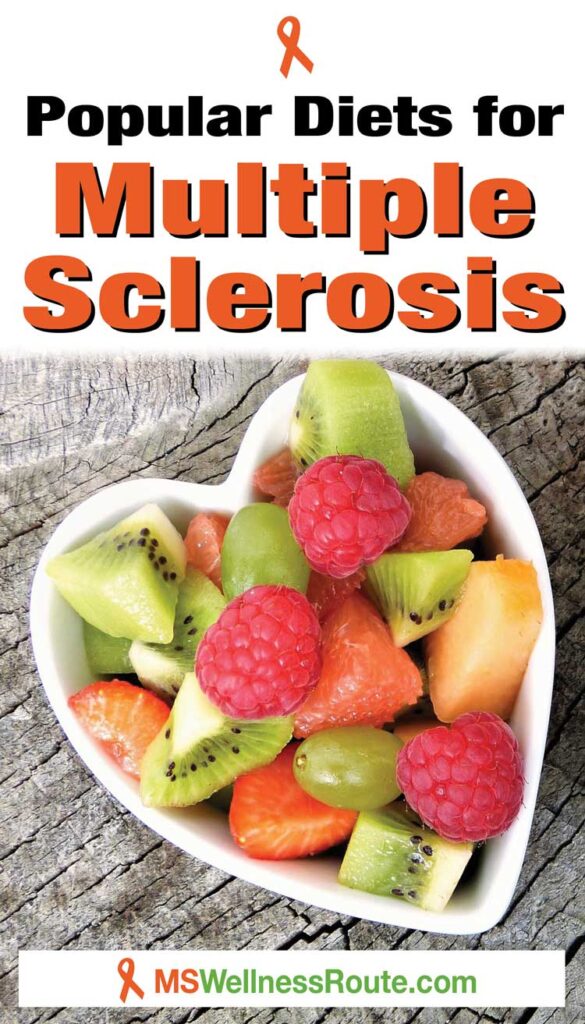Last Updated on November 13, 2023 by Cathy

Multiple sclerosis (MS) is a disease that affects the central nervous system. Currently, there is no cure for MS. But, there are many popular diets that can help manage MS symptoms. Studies show that a healthy diet benefits people with MS and their quality of life.
Some studies say there is no benefit to eating a healthy diet to manage MS. Although, you have to look at who is sponsoring the study. Such as one study from May 2020 by Natalie E Parks. She receives funds from Biogen and Roche, makers of several MS medications.
“There is insufficient evidence to determine whether supplementation with antioxidants or other dietary interventions have any impact on MS-related outcomes.” – PubMed, Natalie E Parks
Another study from March 2022 that has no conflict of interest found the opposite. It said dietary interventions had beneficial results on MS activity and progression.
“In this review, we address the role of nutrition on MS pathogenesis as well as dietary interventions that show promising beneficial results with respect to MS activity and progression.” – PubMed
What you eat does make a difference in how your MS progresses.
Diets for MS

There are several popular diets for people with MS. Each diet helps by slowing the progression of MS. However, not one diet is perfect for everyone.
Diets for MS:
- Best Bet Diet
- Intermittent fasting
- Keto diet
- Low saturated fat diet
- McDougall diet
- Mediterranean diet
- Overcoming MS diet
- Paleo diet
- Swank diet
- Wahls diet
The top two popular diets for MS are the Swank and Wahls diets. Both are beneficial in reducing fatigue and improving the quality of life. Studies found both diets help relieve MS symptoms.
The Swank diet is a low-fat diet developed by Dr. Roy Swank around 1950. He found areas that consumed a higher intake of saturated animal fats had a higher incidence of MS. He did not believe fat caused MS but that a high intake might contribute to more disease progression.
It focuses on lowering saturated fats and increasing the consumption of polyunsaturated fats. A low-saturated fat diet is similar to the Swank diet, but it is not as strict. It allows for a moderate intake of saturated fats. The McDougall diet is also a low-fat diet.
The Wahls diet is a paleo-based diet developed by Dr. Terry Wahls, who has MS herself. It emphasizes nutrient-dense foods. Such as leafy greens, berries, grass-fed meats, and limiting processed foods.
No matter which diet you choose, work on lowering your inflammation.
Foods to Avoid for MS

Obviously, you need to avoid junk food and fast food restaurants. Other foods people with MS should avoid include:
- Dairy
- Gluten
- Artificial coloring
- Artificial sweeteners
- Corn (it’s a GMO)
- Farmed fish
- Junk food
- Processed foods
- Refined sugar (beet sugar and cane sugar)
- Refined vegetable oils such as canola oil
- Soda
- Soy (it’s a GMO)
It is also a good idea to avoid:
- Alcohol
- Conventionally raised red meat (they have antibiotics and growth hormones)
- Conventionally raised poultry (they have growth hormones)
- Eggs (Dr. Terry Wahls found these to be problematic for people with MS)
- Gluten-free grains until you heal (you can add these back later)
- Larger fish like tuna (they have higher levels of mercury)
- Pork (pigs have higher levels of bacteria and parasites)*
*Instead of pork bacon, eat turkey bacon.
Foods to Eat for MS

Fruits and Vegetables: A diet rich in fresh fruits and vegetables is a must for people with MS. Choose a variety of colorful fruits and vegetables every day. They will give you a range of necessary vitamins, minerals, and antioxidants. Fill your plate with mostly fruits and vegetables.
Eat a variety of fruits and vegetables so you won’t be eating the same things every day. This will ensure you are getting enough vitamins, minerals, and phytonutrients.
People have become afraid to eat fruit due to its sugar content. I used to be one of those people. I avoided fruit for almost eight years thinking it raised my blood sugar and fed Candida. Several studies on PubMed say the fruit does not spike blood sugar.
Studies showed fruit actually lowers a person with type 2 diabetes blood sugar. Fruit contains fiber, vitamins, and antioxidants, providing many health benefits.
“Glucose, a form of sugar, is the primary source of energy for every cell in the body. Because the brain is so rich in nerve cells, or neurons, it is the most energy-demanding organ, using one-half of all the sugar energy in the body.” – Harvard Medical School
Mercury and other heavy metals are extremely harmful to the brain and nervous system. Include foods that remove heavy metals. Contrast with MRIs contains heavy metals.
A 2022 study found Epstein-Barr virus is the main cause of MS. This means you also need to eat foods that kill viruses.
Foods that support the brain and nervous system:
- All fruit including apples, citrus, dates, papaya, and wild blueberries
- All vegetables except for corn, it’s a GMO
- Herbs such as cilantro, garlic, and parsley
- Leafy greens such as butter lettuce, red leaf lettuce, romaine, and spinach
- Raw honey
- Seaweeds such as dulse and nori
- Sweet Potatoes
Benefits of Herbs

Herbs and spices add flavor to food. They also provide antioxidants, which help reduce inflammation. Add herbs to all your meals such as basil, garlic, ginger, oregano, turmeric, and thyme.
Herbs are not only flavorful they include medicinal properties. People have used herbs for centuries in traditional medicine. They help with a variety of ailments, such as inflammation, pain, and infection. Some herbs, such as echinacea and ginseng, boost the immune system and prevent colds and flu.
They have antioxidant properties that protect your cells against free radicals. Herbs like rosemary, thyme, and oregano are high in antioxidants. They can help protect cells from damage caused by free radicals.
Countries around the world use them for culinary uses. Many different herbs are often used to enhance the flavor and aroma of food. They are also used as a natural preservative.
The scent of herbs is healing and is often used for Aromatherapy. Some herbs, such as lavender and chamomile promote relaxation and reduce stress. Herbs are also used for cosmetic uses. Herbs like rose and mint are found in natural skin care products to soothe and moisturize the skin.
NOTE: certain herbs can have negative interactions with certain medications. It’s important to speak with your doctor before starting any new herb regimen.
Popular Diets for MS
There are many popular diets for MS. Choose which one works best for you. No matter which diet you are on avoid dairy, gluten, corn, soy, processed foods, and anything that’s not real food.
You also need to work on removing pathogens such as the Epstein-Barr virus, exercise, get enough sleep, and lower stress. Most of all, believe you will heal!

Free Wellness Library!
Subscribe for free and I’ll send you the password to my secret library filled with many printables for your wellness journey.
Want to remember this health tip? Pin it to your Pinterest board!

Photos courtesy of picjumbo.com, pexels.com, and picjumbo.com.
Resources:
https://pubmed.ncbi.nlm.nih.gov/32428983/
https://www.ncbi.nlm.nih.gov/pmc/articles/PMC6470969/
https://www.ncbi.nlm.nih.gov/pmc/articles/PMC8326636/
https://hms.harvard.edu/news-events/publications-archive/brain/sugar-brain
Popular Diets for MS





